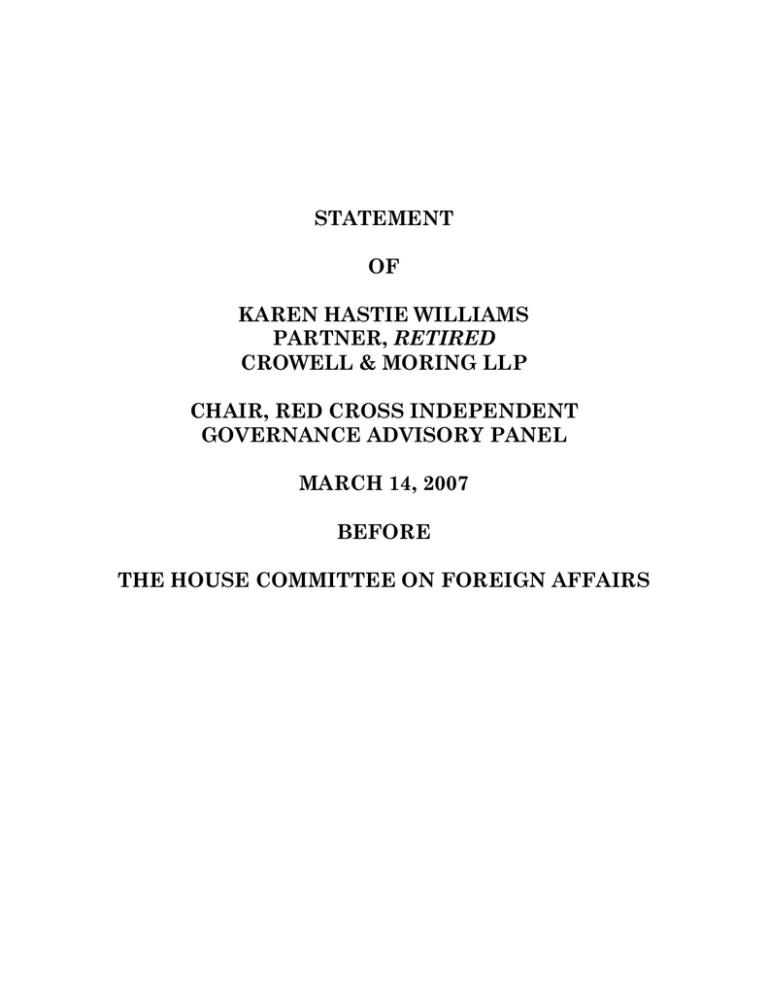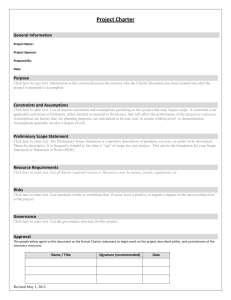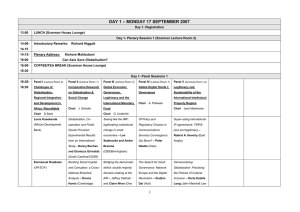STATEMENT OF KAREN HASTIE WILLIAMS RETIRED
advertisement

STATEMENT OF KAREN HASTIE WILLIAMS PARTNER, RETIRED CROWELL & MORING LLP CHAIR, RED CROSS INDEPENDENT GOVERNANCE ADVISORY PANEL MARCH 14, 2007 BEFORE THE HOUSE COMMITTEE ON FOREIGN AFFAIRS Thank you, Mr. Chairman. I am pleased to participate in today’s hearing and to present testimony on the recent governance review process undertaken by the American Red Cross. The charge to the Independent Governance Advisory Panel was to examine the current practices of the Red Cross and recommend reforms to its processes and procedures to better reflect the best practices found today in both for-profit and non-profit organizations. First, let me thank my six colleagues, Peter Clapman, Charles Elson, Margaret Foran, Jay Lorsch, Pat McGuire, and Paul Neuhauser, for their strong support in this project. All worked diligently over the many months of our review to understand the current processes and procedures followed by the Red Cross today and to make constructive suggestions as to what changes would be recommended to improve the management and operations of the Red Cross – both in times of crisis and disaster as well as in their normal activities. I believe that the committee has received copies of our panel’s final report, and I would request that it be made a part 2976284-1 of the record of this hearing. This report provides an excellent roadmap for the American Red Cross and other large non-profit organizations to revise, update and reform their current governance practices, recognizing, however, that the Red Cross has a unique standing in light of its Federal charter. In my brief time I would like to highlight key features of the panel’s report which I believe will serve well both the Red Cross and the American public. The academic literature as well as that from the corporate world is unanimous in requiring smaller sized boards that are more engaged and more actively involved in establishing policies and practices that the officers and managers can follow. The action to reduce its size is a much needed first step. It will require amendments to the Charter to reduce the number of members to no more than 20 by March 2012, to reflect a single category of elected members, all of whom(except the Chair) would be nominated through a board nomination process and elected at the annual meeting to serve staggered three-year terms. Given the unique quasi governmental nature of the Red Cross, the panel agrees that it 2976284-1 is appropriate that the Chair continue to be nominated by the President of the United States on recommendations from the Red Cross Board. Establishment of two leadership councils will serve to further reduce the size of the board, yet retain the availability of advice from Federal and chapter representatives. A Presidentially-appointed Cabinet Council of 8-10 officials from key U.S. governmental departments and agencies, with 1-3 members from the Armed Forces would take the place of current director appointments of government officials who do not regularly participate in the ARC meetings or occasionally send a staff person. With a by-law change a National Leadership Council would be created to facilitate communications between the ARC and its chapters and blood service regions. The Council members would be expected to work in communities and focus on areas such as audit, governance, blood services, and disaster relief. Another important recommendation is for the President and CEO to be a person of stature and experience so that he or she can manage all the parts of the organization. The President 2976284-1 would be appointed by the Red Cross Board on nomination from the Governance Committee and approval by the Board. Once sworn in, the President will need to quickly get to know his personnel and significant issues at headquarters and in the field. For the credibility of the President he must be the principal spokesperson for the Red Cross inside and outside the headquarters building. Although that is not the current situation, our recommendation is that the President and CEO be head of the organization from both a management and operations perspective. This will allow him/her to get to know the key volunteers and employees both at headquarters and in the field who work with issues on a daily basis. It will also provide an opportunity to work with the board members on strategic plans to build the next generation of Red Cross volunteers. While there are numerous other recommendations in our report, I believe that they will follow naturally once the organizational changes are made. 2976284-1 In response to your specific questions, Mr. Chairman, I would reply as follows: (1) To what extent to you agree with the governance recommendations? I support the recommendations 100%. There is clearly a need for greater audit analysis of reports coming into headquarters. By centralizing the review process, the Red Cross can develop standard forms and procedures that will be used by all chapters and blood regions and will facilitate the aggregation of information at the regional centers and ultimately at headquarters. (2) How will such recommendations improve the organization? Consistent treatment of like situations will make the Red Cross practices more transparent and provide a greater accountability for each reporting unit. With clear lines of communication and responsibility response to crisis situations will be greatly improved. 2976284-1 (3) What reforms are additionally necessary to improve the Board of Governor’s governance and oversight functions as well as the management functions of the organization? It will be necessary for the Board to continue reducing the number of Board Members until they are in the 12-20 range. The smaller the Board, the more cohesive the group and also the more likely to understand their role as policy makers and not managers. With the checks and balances included in the legislation the opportunity for oversight by the Congress to assure that the statutory responsibilities are followed. The most significant charter changes recommended by the Panel are included in the current version of a draft bill approved by the Senate Judiciary Committee last week. By eliminating the three classes of Board Members, there will be a single class of directors. With equal footing these directors will have no impediments to working together for the benefit of the Red Cross, American citizens and our international partners. 2976284-1 Thank you, Mr. Chairman, for the opportunity to participate in this hearing. I will be happy to respond to any additional questions that you may have. 2976284-1









